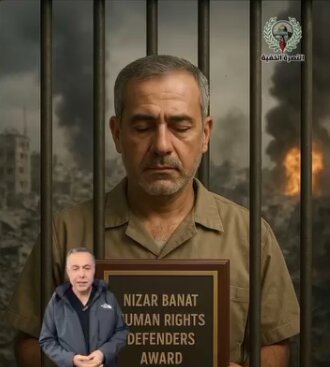Nizar Banat Award highlights struggle of Gaza medical workers
Physicians in Gaza fight on despite brutal attacks

TEHRAN- In the ongoing brutal and relentless war in Gaza, healthcare workers are experiencing multileveled unprecedented threats that go beyond the obvious threats of being in a war zone.
The tragic experience of Dr. Hussam Abu Safiya, director of Kamal Adwan Hospital, and the killing of Dr. Marwan Al Sultan and family, in an Israeli airstrike, capture not only the human cost but also demonstrate systematic violations of international humanitarian law and the total dismantling of safeguards that have historically been provided for healthcare workers in conflicts.
Dr. Abu Safiya’s nightmare illustrates the extreme dangers faced by Gaza’s medical staff.
In an Israeli military raid on Kamal Adwan Hospital, the last operating hospital in northern Gaza in December 2024, Abu Safiya was arrested. He was taken literally at gunpoint. Abu Safiya experienced torture, incommunicado detention, and interrogations in several Israeli detention sites: Sde Teiman, Ofer Prison, and others.
Although he was suffering from serious medical conditions (enlarged heart, high blood pressure), Abu Safiya, like many prisoners, was given inadequate treatment and suffered abuse. Abu Safiya’s detention under Israel’s controversial “unlawful combatant” laws defined by incomplete rights and fair trial standards illustrates how the law works to silence and erase medical professionals.
This personal suffering is compounded by profound family losses. Abu Safiya's son had been killed by an earlier Israeli airstrike on the hospital - and he was still not aware when he was imprisoned and tortured that his mother had died. However, even with all of this tragedy and suffering, he remained a faithful caregiver, treating injured civilians during the everyday shelling and aerial bombardments, until he too was ordered to stand still.
His resilience represents the immense bravery of Gaza's medical staff working under siege, under threat, and without adequate supplies.
In a similar instance to Abu Safiya's family tragedy, Dr. Marwan Al-Sultan, the hospital manager, was brutally murdered along with his wife and five family members on Wednesday (July 2, 2025) during an Israeli airstrike on their house in the al-Tel Hawwa neighborhood.
This assault not only killed a person committed to healing but also completely devastated an entire family, demonstrating the indiscriminate and brutal violence imposed on medical personnel in Gaza.
Systematic targeting and legal impunity
These narratives are not isolated acts but constitute a broader and systematic targeting of medical personnel and health facilities in Gaza. The bombing of Kamal Adwan Hospital and the detention of Dr. Abu Safiya along with other medical staff, wiped out the last big hospital in northern Gaza, depriving thousands of much-needed medical services.
Disregarding international humanitarian laws, which protect medical workers and facilities during conflict, is a matter of grave concern from the standpoint of legal compliance.
Terming Dr. Abu Safiya and others as "unlawful combatants" strips them of minimum guarantees such as due process, medical assistance, and contact with their families disquieting rollback of the very legal protections extended to healthcare workers.
Such labels aid in arbitrarily detaining, torturing, and forcefully disappearing them, contravening human rights and norms of international law that acknowledge medical personnel as neutral actors.
Symbolism and global implications
The awarding of the Nizar Banat Human Rights Defenders Award to Dr. Abu Safiya is a powerful symbol of international recognition for the courage and sacrifice of Gaza’s medical staff. It highlights the crucial role these individuals play in defending human dignity amid conflict and calls global attention to their plight.
Such recognition can galvanize international advocacy, increase pressure on Israeli authorities to respect humanitarian norms and mobilize support for detained and endangered medical workers.
Yet the stories of Abu Safiya and Al-Sultan highlight the urgent need for action at an international level. Beyond symbolic prizes, there is an essential need for enforcement of international law, accountability for violations, and protection mechanisms for healthcare providers in conflict zones.
Without these, the cycle of violence and impunity will continue to erode the underpinnings of Gaza's medical community and the civilian population that relies on them.
Leave a Comment